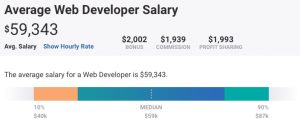In recent years, the digital landscape has experienced an unprecedented boom, resulting in a surge in demand for skilled web developers. This surge has paved the way for countless professionals to explore the realm of freelance web development, offering them greater flexibility, autonomy, and potential for substantial earnings. If you’re considering embarking on a freelance web development career or are simply curious about the financial prospects.
Factors Influencing Freelance Web Developer Salaries
Before delving into specific figures, it’s important to note that freelance web developer salaries can vary significantly depending on various factors. These factors include:
- Experience and Skillset: As with any profession, the level of experience and skill set possessed by a freelance web developer plays a crucial role in determining their earning potential. Seasoned developers with a vast portfolio and diverse skillset can command higher rates compared to those who are just starting out. The level of expertise and experience possessed by freelance developers significantly impacts their earning potential. As in any profession, more advanced skills and extensive experience can command higher rates. Developers who possess specialized knowledge in sought-after technologies or niche areas often have a competitive edge and can charge a premium for their services.
- Specialization: Web development encompasses a wide range of skills and technologies, such as front-end development, back-end development, full-stack development, mobile app development, and e-commerce solutions. Specializing in a niche area or in-demand technology can increase your market value and subsequently influence your salary.
- Geographic Location: Freelancers often work remotely, making the location a less significant factor than in traditional employment. However, the cost of living and prevailing market rates in your region can still affect the rates you can charge. While freelancers can work remotely from anywhere in the world, the geographic location can still impact earning potential. Rates can vary based on the cost of living in a particular region. For example, freelancers based in countries with a higher cost of living may charge more to maintain a comfortable income, while those in regions with a lower cost of living might have lower rates.
- Reputation and Clientele: Building a strong professional reputation and a robust client base takes time, but it can significantly impact your earning potential. Established freelancers with a solid track record and a loyal client base often have the leverage to charge higher rates.
- Demand and Market Conditions: The demand for specific development skills and technologies plays a crucial role in determining income potential. Emerging technologies and trends often create a niche market with higher demand and, consequently, higher rates. Staying abreast of industry trends and acquiring in-demand skills can help freelancers position themselves as valuable assets in the market.
- Reputation and Clientele: Building a strong professional reputation and a loyal client base can significantly impact income. Positive reviews, testimonials, and referrals can attract higher-paying clients and lead to a steady stream of projects. Freelancers with an established reputation often have the leverage to negotiate higher rates or retain long-term clients who value their expertise.
Understanding Freelance Web Developer Compensation Models
When it comes to freelance web development, there are different compensation models that freelancers can adopt. The two most common models are:
- Hourly Rate: Many freelancers charge an hourly rate for their services. This model provides a straightforward approach, where clients pay for the actual time spent on the project. Hourly rates can vary widely, typically ranging from $20 to $150 or more, depending on factors mentioned earlier.
- Project-based Pricing: In this model, freelancers agree on a fixed price for the entire project. The price is determined based on factors like complexity, time commitment, and deliverables. Project-based pricing offers greater predictability for clients and allows freelancers to earn more for efficient work. The rates for project-based pricing can vary greatly depending on the project scope and the freelancer’s expertise.
Average Freelance Web Developer Salaries

While freelance web developer salaries can differ significantly based on the aforementioned factors, we can provide a general overview of average earnings to give you an idea of the potential financial prospects:
- Entry-Level Freelance Web Developers: Those starting out in the field can expect to earn between $20 and $50 per hour or around $2,000 to $5,000 per month, depending on location and experience.
- Mid-Level Freelance Web Developers: With a few years of experience and a growing portfolio, mid-level freelancers can earn between $50 and $100 per hour or around $5,000 to $10,000 per month.
- Senior-Level Freelance Web Developers: Highly skilled and experienced professionals can command rates ranging from $100 to $150 per hour or more, equating to $10,000 to $15,000 per month or higher.
It’s worth noting that these figures are approximate and can vary based on the factors mentioned earlier. Additionally, top-tier freelancers, especially those specializing in niche areas or cutting-edge technologies, can earn well above the ranges mentioned.
Freelance web development offers a world of exciting opportunities for skilled professionals seeking autonomy and financial rewards. While salaries can vary widely depending on factors like experience, specialization, location, and reputation, the freelance web development industry is known for its potential for substantial earnings. By continuously upgrading your skillset, building a strong portfolio, and cultivating a reliable client base, you can pave your way to a lucrative freelance web developer career and unlock a realm of financial freedom and professional fulfillment.

Freelance development has become an increasingly popular career choice in the digital age. The freedom, flexibility, and opportunity to work on diverse projects are just a few of the advantages that attract professionals to the freelance lifestyle. One of the most pressing questions for aspiring freelancers is, “How much can I earn as a freelance developer?”
Average Earning Potential for Freelance Developers:
It’s important to note that freelance developer income can vary greatly depending on the factors mentioned above. However, here’s a general overview of the earning potential based on experience levels:
- Entry-Level Freelance Developers: Freelancers who are just starting out can expect to earn an average of $20 to $50 per hour or around $2,000 to $5,000 per month, depending on their skillset and location.
- Mid-Level Freelance Developers: With a few years of experience under their belt, mid-level freelancers can earn between $50 and $100 per hour or around $5,000 to $10,000 per month. The rates will vary based on specialization and demand for their skillset.
- Senior-Level Freelance Developers: Experienced freelancers with a strong track record and specialized skills can earn upwards of $100 per hour or more, translating to $10,000 or higher per month. Top-tier freelancers who excel in specific technologies or offer unique expertise can command even higher rates.
While it’s challenging to pinpoint an exact figure for freelance developer income due to the variability in factors such as skillset, experience, location, and market conditions, freelance development offers tremendous earning potential. With continuous skill development, strategic marketing, and a focus on building a reputable brand, freelancers can steadily increase their rates and secure higher-paying projects. Ultimately, the income of a freelance developers is dependent on their abilities, market demand, and their ability to position themselves as skilled professionals in a competitive landscape.
What Is the Average Freelance Web Developer’s Salary?
The average freelance web developer’s salary can vary depending on several factors, including experience, skillset, specialization, location, and market demand. While it’s challenging to provide an exact figure, we can provide a general overview of the average earning potential for freelance web developers based on industry trends:
- Entry-Level Freelance Web Developers: Those who are just starting their freelance careers typically earn an average of $20 to $50 per hour or around $2,000 to $5,000 per month. Keep in mind that these figures can vary based on location and the developer’s level of experience.
- Mid-Level Freelance Web Developers: With a few years of experience and a growing portfolio, mid-level freelancers can expect to earn between $50 and $100 per hour or around $5,000 to $10,000 per month. Their rates may increase as they specialize in specific technologies or frameworks.
- Senior-Level Freelance Web Developers: Highly skilled and experienced web developers can command higher rates, typically ranging from $100 to $150 per hour or more. This translates to approximately $10,000 to $15,000 per month or higher. Senior-level freelancers often have a solid reputation, a diverse skill set, and a robust client base.
It’s important to note that these figures are approximate and can vary based on several factors, including geographic location, cost of living, market demand, and the complexity of projects undertaken. Additionally, freelancers who specialize in niche areas or in-demand technologies may have the potential to earn even higher rates.
To accurately assess the earning potential as a freelance web developer, it is recommended to research the prevailing market rates in your specific location and industry. Factors such as competition, project scope, and your unique skillset will ultimately determine the rates you can command as a freelance web developer.
What Is the Hourly Rate for Freelance Web Developers?
The hourly rate for freelance web developers can vary significantly based on several factors such as experience, skillset, specialization, geographic location, and market demand. While it’s challenging to provide an exact figure, here’s a general range of hourly rates for freelance web developers:
- Entry-Level Freelance Web Developers: Those who are starting their freelance careers typically charge hourly rates ranging from $20 to $50. These rates can vary based on factors like location, level of experience, and the complexity of projects undertaken.
- Mid-Level Freelance Web Developers: Freelancers with a few years of experience and a growing portfolio often charge hourly rates ranging from $50 to $100. Rates may increase if the developer has specialized knowledge of specific technologies or frameworks.
- Senior-Level Freelance Web Developers: Highly skilled and experienced web developers typically command higher hourly rates, ranging from $100 to $150 or more. Senior-level freelancers often have a strong reputation, a diverse skill set, and a loyal client base that justifies the higher rates.
It’s important to note that these figures are approximate and can vary based on individual circumstances. Additionally, rates can differ significantly based on factors such as location, industry, project complexity, and the value that the freelancer brings to the client.
When determining your hourly rate as a freelance web developer, it’s crucial to consider your level of expertise, the market rates in your location, your target clients, and the value you provide through your skills and services. Researching the prevailing rates in your specific market and adjusting them based on your unique circumstances can help you establish a competitive and fair hourly rate for your freelance web development services.
What Is a Full-Time Freelance Web Developer Salary?
As a freelance web developer, the concept of a traditional “full-time” salary may differ since freelancers have the flexibility to choose their own working hours and take on multiple clients simultaneously. However, we can provide an estimate of the potential income a full-time freelance web developer can earn in a given year based on industry averages.
It’s important to note that these figures are approximate and can vary based on factors such as experience, skillset, specialization, location, market demand, and the number and size of projects undertaken. Here’s a general overview:
- Entry-Level Full-Time Freelance Web Developers: Those who are starting their freelance careers and working full-time can expect to earn an average annual income ranging from $30,000 to $60,000. This estimate is based on the assumption of a 40-hour workweek and the lower end of the hourly rate range mentioned earlier.
- Mid-Level Full-Time Freelance Web Developers: With a few years of experience and an established client base, full-time mid-level freelancers can earn an average annual income ranging from $60,000 to $100,000 or more. This estimate takes into account the higher end of the hourly rate range mentioned earlier and the assumption of consistent client work throughout the year.
- Senior-Level Full-Time Freelance Web Developers: Highly skilled and experienced web developers who work full-time can potentially earn six-figure annual incomes. Senior-level freelancers can earn an average annual income ranging from $100,000 to $150,000 or more. This estimate considers their expertise, reputation, and ability to secure high-paying projects consistently.
Keep in mind that these figures are general estimates, and the actual income can vary significantly based on individual circumstances. Freelancers have the opportunity to scale their income by securing higher-paying projects, expanding their client base, and continuously upgrading their skills to meet market demands.
Ultimately, the income of a full-time freelance web developer depends on factors such as the rates charged, the number and size of projects undertaken, the ability to attract and retain clients, and the overall efficiency in managing their freelance business.

An entry-level freelance web developer’s salary can vary depending on factors such as location, skillset, experience, and market demand. While it’s challenging to provide an exact figure, here’s a general overview of the salary range for entry-level freelance web developers:
- Hourly Rate: Entry-level freelance web developers typically charge an hourly rate ranging from $20 to $50. This rate can vary based on factors such as the developer’s location, the complexity of projects undertaken, and their level of experience.
- Monthly Income: Assuming a full-time workload of 40 hours per week, an entry-level freelance web developer can earn an average monthly income ranging from $2,000 to $5,000. This estimate is based on the lower end of the hourly rate range mentioned earlier.
It’s important to note that these figures are approximate and can vary based on individual circumstances. Entry-level freelance web developers often charge lower rates as they build their portfolios and gain experience in the field. As their skills and reputation grow, they can gradually increase their rates and earn higher incomes.
Additionally, it’s worth mentioning that entry-level freelance web developers may not always have a consistent flow of projects in the beginning. It may take time to establish a client base and build a solid reputation. Investing in continuous learning, building a portfolio of projects, and networking within the industry can help entry-level freelancers secure more projects and increase their earning potential over time.
Remember, freelance web development offers the flexibility to set your own rates and take on multiple clients simultaneously, allowing for the possibility of increasing your income as you gain more experience and expertise in the field.
The Difference Between Freelancing and Traditional Employment
Freelancing and traditional employment represent two distinct approaches to work. Understanding the differences between the two can help individuals make informed decisions about their career paths. Here are some key distinctions:
Work Arrangement:
- Traditional Employment: In a traditional employment arrangement, individuals are hired by a company or organization as an employee. They work within the company’s structure, adhere to set working hours, and often have a designated workspace.
- Freelancing: Freelancers work independently and are not bound to a single employer. They typically work on a project basis or contract basis, providing services to multiple clients. Freelancers have more flexibility in terms of their work location, hours, and client selection.
Control and Autonomy:
- Traditional Employment: Employees often have less control over their work tasks and assignments. They typically work under the direction and supervision of a manager or team lead, adhering to company policies and procedures.
- Freelancing: Freelancers have greater control and autonomy over their work. They can choose the projects they want to work on, set their own schedules, and have the freedom to make business decisions independently.
Financial Considerations:
- Traditional Employment: In a traditional employment setting, employees receive a regular salary or hourly wage. They may also receive additional benefits such as health insurance, retirement plans, paid time off, and other employee benefits. The employer is responsible for taxes and other payroll-related expenses.
- Freelancing: Freelancers are responsible for setting their rates and negotiating payment terms with clients. They are typically paid per project or on an hourly basis. Freelancers are also responsible for managing their own business expenses, taxes, and benefits such as healthcare and retirement savings.
Job Security and Stability:
- Traditional Employment: Traditional employment often provides more stability and job security compared to freelancing. Employees generally have the assurance of a steady income, employment benefits, and potential career growth within the organization.
- Freelancing: Freelancers may experience fluctuating income and face periods of uncertainty between projects. Job security relies on their ability to consistently secure clients and projects. However, freelancers have the potential for greater earning potential and diversification of work experiences.
Professional Growth and Skill Development:
- Traditional Employment: Employees may have access to training programs, mentorship, and opportunities for career advancement within their organization. They can benefit from working collaboratively with colleagues and learning from experienced professionals.
- Freelancing: Freelancers have the freedom to choose projects that align with their interests and goals, allowing them to focus on specific skill development. They often take the initiative to seek out learning opportunities independently, such as online courses or industry events.
It’s important to consider these factors and personal preferences when deciding between freelancing and traditional employment. Each option offers unique advantages and challenges, and the right choice will depend on an individual’s skills, lifestyle, financial goals, and desired work-life balance.








